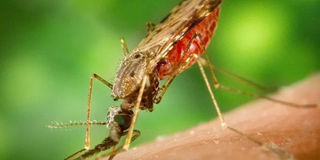Sustained malaria upsurge linked to mutation, drug resistance

A mosquito. PHOTO/FILE
What you need to know:
- Scientists also warn that intermittent use of chemicals and medicine increases the risk of mutation and the development of resistance against a chemical or drug.
Many malaria patients in the country are misdiagnosed and are experiencing treatment failure because of mutation of the malaria parasite and drug resistance, health experts have warned.
The warning comes amid a sustained upsurge in malaria cases in various districts with the current average of 37,600 cases per day, resulting in increased hospitalisation and deaths.
The number is higher than the daily average of 28,000 cases which were registered between April and May.
“The upsurge started around November last year but intensified in March this year.
There is a lot of resistance developing to the Artemisinin-based Combination Therapy (ACT) for malaria [such as Coartem],” Dr Jimmy Opigo, the head of the Malaria Control Programme at the Ministry of Health, told Monitor.
Dr Opigo added: “That means people are taking the medicine but they don’t get cured. And after the medicine, you get [malaria illness] again. But in between, you are also transmitting because you are not cured. The parasite has made some changes in that our Rapid Diagnostic Test (RDT) kits detection is becoming a problem. It will indicate negative when it is not.”
ALSO READ: Lira grapples with high malaria cases
People get malaria after they are bitten by an infected female Anopheles mosquito.
Experts say a medicine that is effective in curing the infected people can cut the transmission.
Malaria kills 16 Ugandans daily and causes an estimated annual economic loss of $658 million (Shs2.4trillion) due to treatment costs and work time lost, according to statistics from the Ministry and a report by Juliet Nabyonga Orem from the World Health Organisation (WHO).
Scientists say
Scientists also warn that intermittent use of chemicals and medicine increases the risk of mutation and the development of resistance against a chemical or drug.
Dr Ian Clarke, the chairman of International Medical Group, said medical workers wrongly give drugs such as antibiotics “because it is more satisfying, to both the doctor and the patient, to make a diagnosis for which there is a definite treatment” so as to get profit and make the patient feel their issue was handled.
On the wrong diagnosis, a recent study by Bosco Agaba from Makerere University, which utilised Polymerase Chain Reaction (PCR) –the gold standard in medical diagnosis, to confirm the accuracy of RDTs, found that “195 (89 percent) of 219 which initially came out negative when RDT was used and positive when a microscope was used, were “falsely registered as negative on the kits.”
“Overall, gene deletion contributed to 12.3 percent (24/195) of false-negative RDT results. Of the false-negative RDTs results, 80.0 percent (156/195) were from subjects with low-density infections,” the report reads in part.




